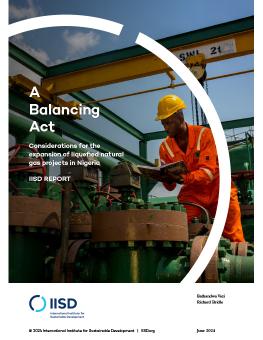
A Balancing Act
Considerations for the expansion of liquified natural gas projects in Nigeria
Nigeria's growing population is in need of wide-ranging solutions to the multidimensional poverty it faces. This IISD report outlines the risks that Nigeria faces in forging ahead with a dash for liquefied natural gas (LNG) to balance their need to grow the economy. It also examines possible external shocks and competition in the LNG export market space, which hinges on European LNG demand. Promised revenue may not be realized as an imminent threat of stranded assets looms ahead.
-
#Nigeria's dash for Liquid Natural Gas (LNG) could result in stranded assets, experts warn. A new @IISD_Energy report finds that Nigeria plans to spend USD 18.5bn on LNG infrastructure demand for LNG is forecast to fall by 2030. Learn more: https://www.iisd.org/publications/report/balancing-act-lng-projects-nigeria
-
With Nigeria's oil revenues falling and amid heightened demand for LNG following Russia's invasion of Ukraine, Nigeria is increasing its focus on its LNG exports. But new research warns that prioritizing LNG will leave its economy exposed. Read the @IISD_Energy report: https://www.iisd.org/publications/report/balancing-act-lng-projects-nigeria
-
Gov't spending on increasing LNG production will hinder true economic diversification. Meanwhile, Nigeria faces population growth, high unemployment, and rising energy demand. A new @IISD_energy report highlights key concerns: https://www.iisd.org/publications/report/balancing-act-lng-projects-nigeria
Nigeria’s economy remains heavily dependent on oil exports, but output has fallen in recent years. There is increasing focus on LNG in Nigeria, which is already the world’s sixth largest LNG exporter, with a 6% market share in 2022 and an annual production capacity of 22.5 million tonnes. In fact, the government has described 2021–2030 as the “decade of gas,” signalling its intent to focus on this resource. However, LNG production has been marked by conflicts, theft, and risks around the transport of gas, fuelling concerns about the industry's impact on local communities. In addition, environmental issues include gas flaring, greenhouse gas emissions, and health issues associated with emissions.
Despite increased demand for LNG in Europe due to Russia's supply reduction, long-term demand for LNG is not certain. Attempts to substitute declining oil revenues with LNG exports may not be successful due to uncertain future demands for LNG in the global marketplace—and more investments will be required to get the LNG ready for export over 5 to 10 years before any revenue can be realized. Efforts to expand LNG may see producer fossil fuel subsidies rise, stifling efforts for true economic diversification. Moreover, a major effort to expand Nigeria’s LNG exports presents a risk of stranded assets as European demand for gas declines in line with climate targets.
Global trends favoring clean energy may clash with increased LNG investment. The shift to a low-carbon world could leave Nigeria with another fossil-based income source determined by external global price fluctuations. Increasing investments in LNG increases the potential impact of asset stranding and may undermine the broader development interests for Nigeria.
Participating experts
You might also be interested in
The Cost of Fossil Fuel Reliance
Government support for fossil fuels reached at least USD 1.5 trillion in 2023, new data shows.
Ending Export Credits for Oil and Gas: How OECD countries can end 2024 with a climate win
For a year now, Organisation of Petroleum Exporting Countries (OECD) governments have been negotiating an agreement that could put an end to oil and gas export finance. Following the acrimony in Baku, this would be a very real way for the OECD to show policy coherence, respond to calls from the poorest countries to stop subsidizing fossil fuels, and shift public finance to solutions.
Fossil Fuel Production, Renewable Energy, and Subsidy Reform in Nationally Determined Contributions 3.0
This policy brief provides an analysis of the critical benchmarks and recommendations necessary for aligning nationally determined contributions (NDCs) with the 1.5 °C target.
The United Kingdom, New Zealand, and Colombia Join Coalition to Phase Out Fossil Fuel Subsidies
Today on the sidelines of the UN Climate Conference in Baku (COP 29), the United Kingdom, New Zealand, and Colombia joined the international Coalition on Phasing Out Fossil Fuel Incentives Including Subsidies (COFFIS).